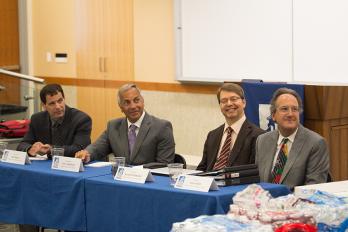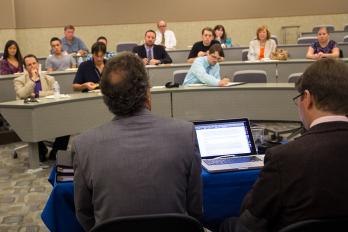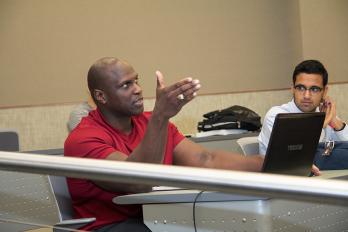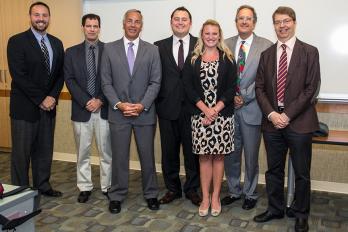Panel Previews SCOTUS Docket for New Term
September 18, 2013
In honor of Constitution Day, Tuesday, September 17, TJSL hosted the “Supreme Court Preview” Panel, featuring TJSL Professor Bryan Wildenthal along with local Professors Glenn Smith of California Western School of Law, Michael Ramsey of the University of San Diego School of Law and the panel moderator, the Honorable Larry Alan Burns of the U.S. District Court in San Diego. The panel was co-sponsored by the Federal Bar Association, and by the TJSL Student Chapter and the San Diego Lawyers Chapter of the Federalist Society.
“This panel provided an overview of the most important and interesting cases already on the U.S. Supreme Court’s docket for its upcoming 2013-14 term, which begins October 7, as well as some cases in which the Court may well grant review,” said Professor Wildenthal. “The panelists discussed a case dealing with the president’s power to make unilateral ‘recess’ appointments, without Senate confirmation, when the Senate is not session. This could be one of the most important separation of powers cases in decades.”
“What seemed to spark most of the panel and audience’s interest was whether or not recess appointments made by both parties are constitutional,” said TJSL Federalist Society member Brittany Walker (3L). “This issue is a particularly interesting topic, as recess appointments have been very politicized topic for over 150 years.”
“I thought each of the speakers provided thoughtful yet accessible summaries of their respective cases,” said San Diego Federalist Society Social Media Chair Paul D. McGuire. “You could really tell that each one of them was excited to see how these cases resolve. I was particularly interested in hearing about the Bond case, where a woman was prosecuted under a chemical weapons treaty, because I have been following it since the last time it was at The Supreme Court.”
“I thought it was a good idea to co-sponsor this event because it shows that we here at the Federalist Society have access to and will continue to bring world class thinkers and speakers to our events, who will come from a variety of perspectives and are experts on numerous topics,” noted TJSL Federalist Society President Chase Victorson (3L).
The TJSL Federalist Society recently re-chartered as an organization after a four-year hiatus.
“This event was in line with my mission in re-chartering the Federalist Society here at TJSL,” said Victorson. “I want to inspire discussion about important issues. I want people to become involved and talk about things that are not likely to come up in class, which is precisely what this panel did.”
“The panel organized by the Federalist Society was excellent, because there were cases covering several relevant topics, like same sex marriage and the Ninth Circuit’s attempt to make changes to personal jurisdiction claims,” said Timothy Bradford (1L). “This is especially relevant to me, since we are covering personal jurisdiction in civil procedure right now. The entire expert panel really gave the audience a sneak peek into the leanings of the Court and to where it is likely heading in the near future.”
Professor Wildenthal hopes that students attending the event walked away with a good understanding about the upcoming Supreme Court session. “Those attending the presentation hopefully got a sense of the remarkably diverse range of important cases that will occupy the Supreme Court’s time and attention during the next year,” he said.
The panel also discussed cases dealing with racial affirmative action preferences, religious freedom, the contraceptive coverage mandate under President Obama’s Affordable Care Act health reform legislation, abortion rights, freedom of speech, Congress’s power to enforce the international chemical weapons convention and court jurisdiction over multinational companies.



